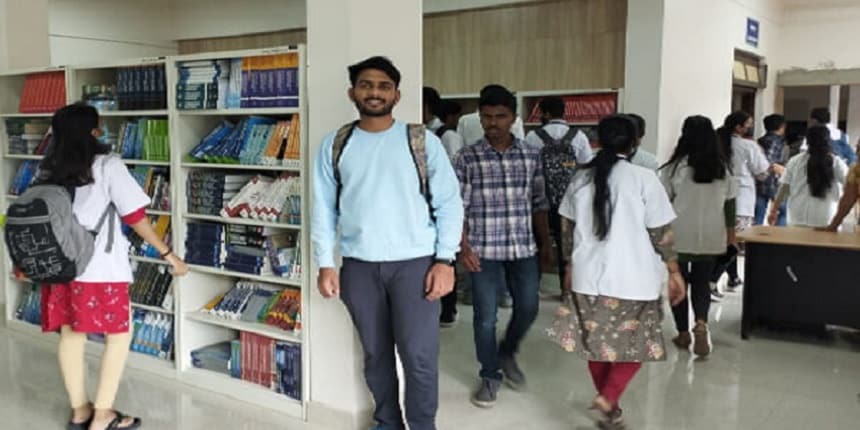NMC’s new MBBS curriculum violates rights of LGBTQ+, disabled; will complain to WFME: Activists
Anu Parthiban | September 3, 2024 | 05:35 PM IST | 4 mins read
NMC: LGBTQ+ community activists and others strongly criticized the revised MBBS curriculum which teaches that sodomy and lesbianism are “unnatural sexual offences”.
NEET 2026 Free Mock Test with Solutions
Download the NEET 2026 Free Mock Test PDF with detailed solutions. Practice real exam-style questions, analyze your performance, and enhance your preparation.
Download EBook
NEW DELHI: Two organisations that are internationally involved in inclusion of disabled and transgender people in medical education have written to the Union health minister Jagat Prakash Nadda and to the chairman of National Medical Commission (NMC) BN Gangadhar flagging violation “two key legislations of India—the Rights of Persons with Disabilities Act (RPDA) 2016 and the Transgender Persons (Protection of Rights) Act (TPA) 2019”.
The revised Competency-Based Medical Education Curriculum (CBME) guidelines published by the NMC on August 31 has sparked a controversy. LGBTQ+ community activists and others strongly criticized the revised MBBS curriculum which teaches that sodomy and lesbianism are “unnatural sexual offences” and has been included under the “sexual offences” topic within clinical forensic medicine.
Furthermore, it had letter multiple letters addressing NMC and suggested incorporating disability and trans-affirmative competencies into the Foundation Course, Curriculum Support Implementation Program (CISP). However, it was not acknowledged. It also has filed a RTI in this regard on September 1.
If the NMC does not respond, they will write to the World Federation of Medical Education for temporary suspension of NMC’s recognition by the WFME, as per the joint statement. They also urged the health minister for removal of the illegal content from the CBME 2024 and reintroduction of the mandatory disability and queer-affirmative competencies at the earliest —not just in the Foundation Course but longitudinally in AETCOM.
Also read NMC: Sodomy, lesbianism ‘sex offences’; 75% attendance in electives must for NExT exam
New CBME curriculum
The Medical Council of India, which was replaced by the NMC on September 25, 2020, introduced the CBME curriculum in 2019. Five years later, the NMC has “has revised the CBME curriculum, unveiling the outdated and archaic CBME 2024 curriculum”, it said.
The letter was written by Satendra Singh, co-chair, International Council for Disability Inclusion in Medical Education, and Disability Core Group, National Human Rights Commission (NHRC) and Air Cmde (Dr) Sanjay Sharma (Retd) CEO and managing director of Association for Transgender Health in India (ATHI) and board member of World Professional Association for Transgender Health (WPATH).
The new curriculum is “outright ableist and queerphobic” and “also contravene judgments by the Chennai and Kerala High Courts, as well as the World Health Organization’s (WHO) Global Report on Health Equity for Persons with Disabilities, 2022. The new curriculum also defies the World Federation for Medical Education’s (WFME) Global Standards for Quality Improvement: Basic Medical Education, 2020”.
NMC’s recognition status
The WFME was founded in 1972 and established through a initiative of WHO and World Medical Association. The global organisation was especially dedicated to the education and training of medical doctors.
In September 2023, the NMC was awarded Recognition Status for ten years by the WFME. “However, the Recognition Committee has the discretion to require a full review within this period if there are concerns about the sustainability of the accreditation process's quality. Any such complaint regarding the dilution of standards could lead to temporary suspension, withdrawal of recognition, or denial of the recognition status,” the letter read.
“Recognized agencies are monitored by the WFME throughout the duration of recognition and are required to complete a Status Report annually, starting six to eighteen months after formal recognition—making the NMC due for this Status Report,” it added.
MBBS Curriculum: Foundation courses
According to the new CBME curriculum, the foundation course, which was initially allotted a month, has now been reduced to just two weeks “with sports given eight protected hours, yet no mention is made of the seven hours dedicated to disability competencies”.
Disability rights as mandatory disability competencies were introduced in Foundation courses in the CBME curriculum 2019 based on Dr Singh’s judicial advocacy. This move was acknowledged by several international organisations.
“The efforts were acknowledged on page number 55 of the patented NMC document. The inclusion of these mandatory disability competencies was highlighted as one of 17 lighthouse initiatives by UN India to showcase progress UN Sustainable Development Goals (SDG 10: Reduce inequality within and among countries) during the SDG mid-point review at UNGA78 in New York on 22nd September, 2023.
“This best practice from India was echoed by the National Council on Disability in the USA, which wrote to accrediting bodies (ACGME and Joint Commission) in 2021 regarding Disability Competency training for medical professionals.”
“The World Health Organization’s most evidence based guidelines, the “Global Report on Health Equity for Persons with Disabilities, 2022” also mandated disability competency training for all health worker training programs, developed in consultation with people with disabilities. This was further substantiated in our paper in The Lancet in 2023,” it added.
The organisations opined that “these competencies should have been integrated longitudinally throughout the curriculum in AETCOM but are conspicuously absent from the 2024 curriculum”.
Follow us for the latest education news on colleges and universities, admission, courses, exams, research, education policies, study abroad and more..
To get in touch, write to us at news@careers360.com.